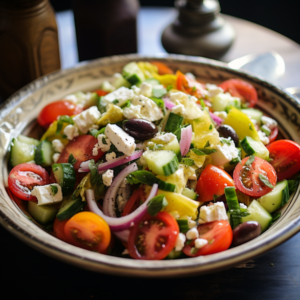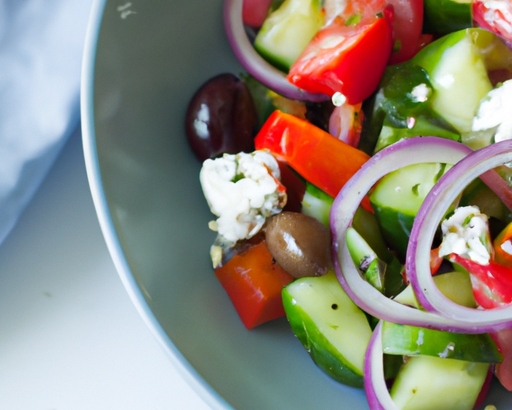Imagine indulging in a mouthwatering burst of flavors that transport you to the stunning shores of Greece. Picture a colorful medley of fresh vegetables, plump olives, and tangy feta cheese, all lovingly tossed together with a drizzle of fragrant olive oil and zesty lemon juice. This is the essence of the Mediterranean Greek Salad, a delectable fusion of Greek and American influences that will leave your taste buds dancing with delight.

Ingredients
Fresh Vegetables
Fresh vegetables are an essential component of a Mediterranean Greek salad. Opt for a variety of colorful vegetables such as tomatoes, cucumbers, bell peppers, and red onions. These vegetables are not only delicious but also rich in vitamins, minerals, and antioxidants that contribute to your overall well-being.
Olives
Olives bring a distinctive and tangy flavor to the Mediterranean Greek salad. Choose your favorite variety of olives, whether it’s Kalamata, green, or black olives. Remember to pit and slice the olives before adding them to the salad to ensure easy and enjoyable consumption.
Feta Cheese
Feta cheese is a staple in Greek cuisine and adds a creamy and salty element to the salad. Crumble the feta cheese and sprinkle it over the salad to evenly distribute its flavors. Feta cheese is not only delicious but also a good source of calcium and protein.
Olive Oil
Olive oil serves as the base for the salad dressing, bringing a smooth and rich flavor to the mix. It is a key ingredient in Mediterranean cuisine and provides healthy fats that are beneficial for heart health. Use extra-virgin olive oil for the best taste and quality.
Lemon Juice
Lemon juice adds a refreshing and tangy taste to the dressing. It complements the flavors of the vegetables and feta cheese, giving the salad a vibrant and zesty kick. In addition to its flavor-enhancing properties, lemon juice is also loaded with vitamin C and antioxidants.
Preparation
Wash and Chop the Vegetables
Before adding the vegetables to the salad, make sure to wash them thoroughly under running water. This step helps remove any dirt or impurities. After washing, chop the vegetables into bite-sized pieces, ensuring a balanced mix of textures and flavors in every mouthful.
Pit and Slice the Olives
To pit the olives, simply press them gently with the side of a knife, and the pit should easily pop out. Then, slice the olives into thin rounds or leave them whole, depending on your preference. Slicing the olives allows their flavors to spread evenly throughout the salad.
Crumble the Feta Cheese
Take the block of feta cheese and crumble it into small pieces using your hands. This will distribute its creamy and salty taste evenly throughout the salad. The crumbled feta cheese adds a delightful texture and a burst of flavor to every bite.
Mix the Fresh Vegetables, Olives, and Feta Cheese in a Large Bowl
Once you have prepared all the ingredients, combine the fresh vegetables, olives, and crumbled feta cheese in a large bowl. Gently toss the ingredients together to ensure an even distribution. This mixing will create a beautiful medley of colors and flavors, making the salad visually appealing and appetizing.
Dressing
Combine Olive Oil and Lemon Juice
In a separate container, combine olive oil and fresh lemon juice. Use a ratio of approximately three parts olive oil to one part lemon juice. The olive oil adds a smooth, rich quality to the dressing, while the lemon juice provides a tangy and refreshing element.
Whisk the Dressing Until Emulsified
Using a whisk or fork, vigorously mix the olive oil and lemon juice together until they emulsify. This process helps the ingredients combine and creates a creamy and well-blended dressing. The emulsification ensures that the dressing coats every ingredient in the salad uniformly.
Pour the Dressing Over the Salad Mixture
Once the dressing is well-mixed, pour it over the salad mixture in the large bowl. Ensure that the dressing is evenly distributed throughout the salad, coating each vegetable, olive, and feta cheese crumble. This step enhances the overall taste of the salad and brings all the flavors together in harmony.
Toss the Salad to Evenly Coat with the Dressing
Using two large spoons or salad tongs, gently toss the salad to ensure that the dressing coats every component of the salad. This tossing motion helps evenly distribute the dressing, creating a harmonious blend of flavors. Be careful not to toss the salad too vigorously, as you don’t want to crush the vegetables or feta cheese.
Variations
Mediterranean Quinoa Greek Salad
For a heartier and more filling meal, consider adding cooked quinoa to your Mediterranean Greek salad. Quinoa provides added protein and fiber, making the salad a complete and satisfying dish. Simply cook the quinoa according to the package instructions and mix it in with the other ingredients before adding the dressing.
Greek Pasta Salad
If you’re in the mood for a pasta-based salad, turn your Mediterranean Greek salad into a Greek pasta salad. Cook your choice of pasta according to the package instructions and let it cool before adding it to the salad mixture. The pasta adds a delightful chewiness and pairs perfectly with the fresh vegetables, olives, and feta cheese.
Grilled Chicken Greek Salad
For a protein-packed option, grill or cook chicken breasts and slice them into thin strips. Add the grilled chicken to your Mediterranean Greek salad to create a more substantial and satisfying dish. The savory and juicy chicken complements the flavors of the salad, creating a well-rounded and nutritious meal.
Greek Salad Skewers with Tzatziki Sauce
For a fun and eye-catching twist, skewer the fresh vegetables, olives, and feta cheese on wooden skewers. These Greek salad skewers make for a delightful appetizer or a unique way to serve the salad at a gathering. Serve them alongside a homemade tzatziki sauce for dipping, adding a cool and creamy element to the dish.
Health Benefits
Rich in Antioxidants
Mediterranean Greek salad is packed with various vegetables, olives, and feta cheese, all of which are abundant sources of antioxidants. Antioxidants help protect your cells from damage caused by harmful molecules called free radicals. Including this salad in your diet can contribute to your overall health and well-being.
Good Source of Vitamins and Minerals
The fresh vegetables in the Mediterranean Greek salad provide an array of essential vitamins and minerals. Tomatoes are rich in vitamins A and C, cucumbers provide hydration and vitamin K, bell peppers offer vitamins A and C, while red onions provide essential minerals like potassium and manganese. Eating this salad regularly ensures that you obtain essential nutrients to support your body’s optimal functioning.
Promotes Heart Health
The Mediterranean Greek salad offers several heart-healthy ingredients. Olive oil, a key component of the salad dressing, contains monounsaturated fats, which can help lower bad cholesterol levels, reduce inflammation, and improve heart health. The inclusion of fresh vegetables also contributes to a heart-healthy diet by providing essential nutrients and fiber.
Supports Weight Management
With its abundance of fresh vegetables and low-calorie dressing, the Mediterranean Greek salad is an excellent choice for those looking to manage their weight. The high fiber content in the vegetables and the protein-rich feta cheese help promote satiety, keeping you fuller for longer. Enjoying this salad can be a satisfying and nutritious option for maintaining a healthy weight.
Provides Hydration
Cucumbers and tomatoes, two key components of the Mediterranean Greek salad, have high water content, making the salad an excellent hydrating option, especially during hot summer months. Consuming hydrating foods like this salad can contribute to your overall hydration levels and support your body’s proper functioning.
Boosts Immune System
The fresh vegetables in the Mediterranean Greek salad are rich in vitamins, minerals, and antioxidants that can boost your immune system. Vitamin C from tomatoes and bell peppers, along with the antioxidants from olives, help strengthen your immune system, protecting against common illnesses. Including this salad in your diet can help keep your immune system strong and resilient.
History
Origins in Ancient Greece
The Mediterranean Greek salad traces its roots back to ancient Greece. Ancient Greeks cultivated a variety of vegetables and used them in their cooking. The combination of fresh vegetables, olives, and cheese was a common practice in Greek cuisine, and it eventually evolved into the Mediterranean Greek salad that we know and love today.
Traditional Greek Cuisine
Greek cuisine has a rich history and is known for its emphasis on fresh, simple, and flavorful ingredients. The Mediterranean Greek salad is just one example of the many traditional Greek dishes that highlight the vibrant flavors of vegetables, olives, and feta cheese. Traditional Greek cuisine showcases the creativity and resourcefulness of the Greek people throughout history.
Popularization in Mediterranean Cuisine
The Mediterranean Greek salad became popular not only in Greece but also throughout the Mediterranean region. Many countries bordering the Mediterranean Sea adopted this refreshing and healthy salad, incorporating it into their own cuisines. The salad’s simplicity, versatility, and health benefits made it a beloved dish across the Mediterranean.
International Popularity
In recent years, the Mediterranean Greek salad has gained popularity on a global scale. Its fresh and vibrant flavors, nutritious ingredients, and association with the Mediterranean diet have made it a favorite among health-conscious individuals and food enthusiasts worldwide. Whether enjoyed in a Greek restaurant or prepared at home, the Mediterranean Greek salad has become an international culinary sensation.
Cultural Significance
Symbol of Greek Culinary Heritage
The Mediterranean Greek salad holds a significant place in Greek culinary heritage. It represents the use of fresh, wholesome ingredients and the commitment to simple yet delicious flavors. The combination of vegetables, olives, and feta cheese showcases the flavors and traditions that have been passed down through generations in Greek cuisine.
Part of Traditional Greek Meals
In Greece, the Mediterranean Greek salad is often served as part of a traditional Greek meal. It is enjoyed alongside various other Greek dishes, such as moussaka, souvlaki, or tzatziki. The salad’s refreshing taste and nutritious qualities complement and balance the flavors of other Greek dishes, creating a well-rounded dining experience.
Representative of the Mediterranean Diet
The Mediterranean Greek salad is an iconic representation of the Mediterranean diet, which emphasizes fresh fruits and vegetables, whole grains, lean proteins, and healthy fats. This diet is renowned for its health benefits, including reduced risk of heart disease and improved longevity. The Mediterranean Greek salad perfectly encapsulates the principles and flavors of this celebrated dietary pattern.
Inclusion in Greek Festivals and Celebrations
Greek festivals and celebrations often feature the Mediterranean Greek salad as a staple dish. Whether it’s a traditional wedding, religious feast, or cultural event, you are likely to find this refreshing salad on the menu. The salad’s vibrant colors and enticing flavors make it a perfect addition to any festive gathering, embodying the spirit of Greek hospitality and culinary tradition.
Nutritional Profile
The Mediterranean Greek salad offers a variety of nutrients that contribute to a well-balanced diet. Here is a breakdown of its nutritional profile:
Calories
The exact calorie content of the salad will depend on the specific portions and dressing used. However, the Mediterranean Greek salad is generally considered a low-calorie dish, making it suitable for those watching their calorie intake.
Protein
While the salad is not primarily a protein-rich dish, the feta cheese provides a moderate amount of protein. This makes the Mediterranean Greek salad a good choice for those looking to increase their protein intake.
Fat
The primary source of fat in the salad comes from the olive oil used in the dressing. Olive oil contains heart-healthy monounsaturated fats, which contribute to the overall nutritional value of the salad.
Carbohydrates
The majority of carbohydrates in the Mediterranean Greek salad come from the fresh vegetables. These carbohydrates provide essential energy for your body to function optimally.
Fiber
The salad’s fiber content mainly comes from the fresh vegetables and olives. Fiber is essential for healthy digestion and can help keep you feeling full and satisfied.
Vitamins
The fresh vegetables in the Mediterranean Greek salad provide a wide range of vitamins, including vitamins A, C, K, and various B vitamins. These vitamins play crucial roles in supporting overall health and wellness.
Minerals
The salad’s mineral content primarily comes from the feta cheese and fresh vegetables. These ingredients provide essential minerals such as calcium, potassium, magnesium, and iron.
Tips and Serving Suggestions
Use Ripe and Flavorful Vegetables
To enhance the taste of your Mediterranean Greek salad, choose ripe and flavorful vegetables. Look for tomatoes that are juicy and aromatic, cucumbers that are crunchy and refreshing, and bell peppers that are vibrant and sweet. Using fresh, high-quality vegetables will elevate the flavors of the salad.
Experiment with Different Olive Varieties
Olives come in various varieties, each offering a unique taste and texture. Don’t be afraid to explore different types of olives and experiment with their flavors in your salad. From Kalamata to green to black olives, you can create different taste profiles and discover new combinations that suit your palate.
Adjust Dressing Ingredients to Personal Taste
The dressing in the Mediterranean Greek salad can be easily customized to suit your personal preferences. If you prefer a tangier flavor, add more lemon juice. If you prefer a milder taste, reduce the amount of lemon juice. Adjust the ratio of olive oil to lemon juice according to your liking for a perfectly balanced dressing that suits your taste buds.
Serve Chilled for a Refreshing Experience
For the most refreshing and enjoyable experience, serve the Mediterranean Greek salad chilled. You can refrigerate the salad for an hour or two before serving to allow the flavors to meld together and for the vegetables to become crisp and cool. The chilled salad offers a delightful contrast to the warm weather and is perfect for outdoor picnics and gatherings.
Garnish with Fresh Herbs for Added Flavor
To add an extra burst of freshness and flavor, garnish your Mediterranean Greek salad with fresh herbs. Consider using mint, parsley, or dill to elevate the taste and provide a vibrant visual appeal. The herbs will complement the salad’s ingredients harmoniously and enhance the overall dining experience.
Accompaniments
Freshly Baked Bread or Pita
To make your Mediterranean Greek salad into a more substantial meal, serve it alongside freshly baked bread or pita. The bread can be used to mop up the delicious dressing or to create mini sandwiches with the salad. The combination of the salad’s flavors and the bread’s texture creates a satisfying meal.
Greek Yogurt or Tzatziki Sauce
To add another layer of creaminess and tang to your meal, serve Greek yogurt or tzatziki sauce on the side. These cool and refreshing condiments complement the flavors of the Mediterranean Greek salad perfectly. They also provide a protein-rich option for those looking to increase their protein intake.
Marinated Grilled Chicken or Shrimp
For a protein-packed meal, pair your Mediterranean Greek salad with marinated and grilled chicken or shrimp. The savory and juicy meat or seafood blends harmoniously with the salad’s flavors, creating a satisfying and well-rounded dish. It’s a perfect option for those who are looking for a complete and balanced meal.
Greek Wine or Lemon-Infused Water
To complete your Greek dining experience, pair your Mediterranean Greek salad with a glass of Greek wine or lemon-infused water. Greek wines, such as Assyrtiko or Agiorgitiko, offer a unique taste that complements the salad’s flavors. Alternatively, enjoy a refreshing glass of water infused with slices of fresh lemon, creating a citrusy and invigorating beverage.
Whether you’re enjoying the Mediterranean Greek salad as a light lunch, a side dish, or a main course, these accompaniments will enhance your dining experience and transport your taste buds to the vibrant culinary world of Greece.
Chef on a Bike is an immersive and community-driven culinary platform
that serves as a hub for individuals passionate about Greek cuisine. Rooted in the rich heritage of Greek cooking traditions, this platform offers a diverse range of authentic recipes, insightful articles, and interactive cooking sessions led by experienced Greek chefs.




As a culinary community, “Chef on a Bike” goes beyond just recipes; it creates a vibrant space where enthusiasts of Greek cuisine can come together to celebrate and explore the intricacies of this delightful culinary world. Here, the aroma of fresh herbs and the love for hearty Greek meals permeate the atmosphere, fostering a sense of camaraderie among its members.
The platform’s mission is twofold: firstly, to bridge the culinary divide between novice and seasoned cooks, providing valuable guidance and knowledge for those looking to embark on a Greek culinary journey. Secondly, it strives to fuse the time-honored traditions of Greek cooking with innovative approaches, ensuring that these traditions remain alive and vibrant in the modern culinary landscape.
“Chef on a Bike” is not merely a source of recipes; it’s a welcoming community that brings together individuals who share a common passion for Greek cuisine. It embodies the essence of Greek cooking in every stir, every chop, and every simmer, allowing members to discover, learn, and savor the flavors of Greece in their own kitchens.
For those seeking culinary inspiration, authentic recipes, and a deeper connection with Greek cuisine, “Chef on a Bike” stands as a trusted and enriching resource. It’s where the love for Greek culinary traditions thrives, fostering an environment of exploration, learning, and shared culinary experiences.
For a deeper dive into the world of Greek culinary traditions, join us on YouTube Chef on a Bike. Our platform is more than just recipes; it’s a thriving community where the love for Greek cuisine flourishes.
Stepping into our culinary world, you’ll be enveloped in the aromas of hearty Greek meals and the camaraderie that accompanies sharing food. Our mission is clear yet profound – to bridge the culinary gap between novices and seasoned chefs, fuse ancient traditions with modern innovations, and unite Greek cuisine enthusiasts with the warmth of the Greek kitchen.
For additional culinary insights and expertise, explore Anna-Maria Barouh, where culinary knowledge is shared within our community. Discover About-US, featuring Bob Stavrou, whose contributions enrich our culinary journey. Past Episodes


















